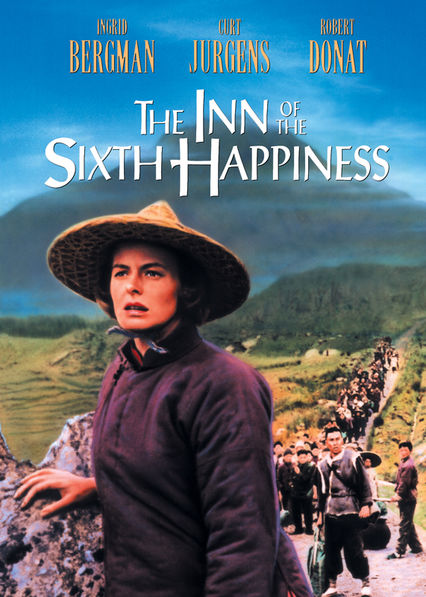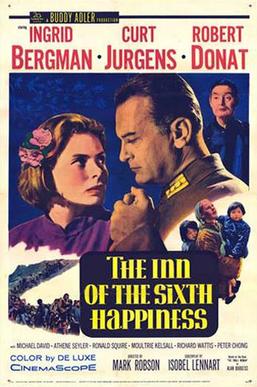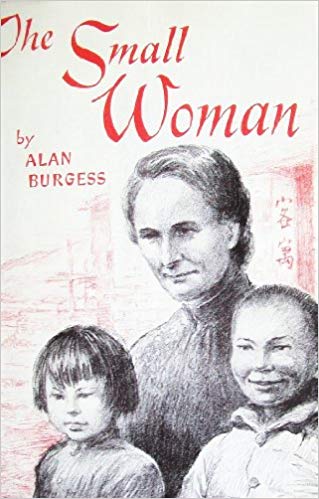Inn Of Sixth Happiness
Inn Of Sixth Happiness , a movie based on the the life of Gladys Aylward (1902 to 1970)


《六福客栈》是二十世紀福斯于1958年出品的一部电影,根据第二次世界大战时在中国传教的英国女传教士艾伟德的真实故事改编而成。
我1968生在台湾,没听过这个。住美国30年,也没听过。这是原本海报,与现在的海报
The movie, is largely a fiction of Hollywood, as it changed lots of things.
Gladys May Aylward (24 February 1902 to 3 January 1970) was a British evangelical Christian missionary to China, whose story was told in the book The Small Woman, by Alan Burgess, published in 1957, and made into the film The Inn of the Sixth Happiness, starring Ingrid Bergman, in 1958. The film was produced by Twentieth Century Fox, and filmed entirely in North Wales and England.[1]
2018-10-04 Wikipedia Gladys Aylward
The real Gladys Aylward (1902 to 1970) was born in London. She was a former domestic in the household of Sir Francis Younghusband turned missionary in China and is best known for her work with children. Aylward became a Chinese citizen in 1936. Four years later, despite being in ill health herself, she led more than 100 children over the mountains to safety at the height of the Second Sino-Japanese War (1937-45).
A film based on her life, The Inn of the Sixth Happiness, was released in 1958. It drew from the book The Small Woman, by Alan Burgess. Although she found herself a figure of international interest due to the popularity of the film, and television and media interviews, Aylward was mortified by her depiction in the film and the liberties it took.[citation needed] The tall (1.75m/5’ 9”), blonde Swedish actress Ingrid Bergman was inconsistent with Aylward's small stature, dark hair and North London accent. The struggles of Aylward and her family to effect her initial trip to China were disregarded in favour of a movie plot device of an employer “condescending to write to ‘his old friend’ Jeannie Lawson.” Also, Aylward's dangerous, complicated travels across Russia, China and Japan were reduced to, “a few rude soldiers”, after which, “Hollywood's train delivered her neatly to Tsientsin.”[10] Many characters and place names were changed, even when these names had significant meaning, such as those of her adopted children and the name of the inn, named instead for the Chinese belief in the number 8 as being auspicious. For example, in real life she was given the Chinese name 艾偉德 (Ài Wěi Dé- a Chinese approximation to ‘Aylward’ – meaning ‘Virtuous One’), however in the film she was given the name 真爱 Jen-Ai,( pronounced- Zhen-Ai, meaning “true love”).[11] Colonel Linnan was portrayed as half-European, a change which she found insulting to his real Chinese lineage, and she felt her reputation was damaged by the Hollywood-embellished love scenes in the film. Not only had she never kissed a man, but the film's ending portrayed her character leaving the orphans to re-join the colonel elsewhere,[12] even though in reality she did not retire from working with orphans until she was 60 years old.[13]

Alan Burgess (1 February 1915 to 10 April 1998) was an RAF pilot and English author who wrote several biographical and non-fiction books between the 1950s and the 1970s. He wrote biographies of Gladys Aylward,[1] and Flora Sandes,[2] and co-wrote Ingrid Bergman's autobiography.[3] Bergman played Gladys Aylward in the film The Inn of the Sixth Happiness based on Burgess's biography.
Having served in the RAF during World War II,[4] he went on to write The Longest Tunnel: The True Story of World War II's Great Escape,[5] the story of “the Great Escape”.
2018-10-04 Wikipedia Alan Burgess